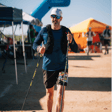
James Horman
James is a Masters athlete and he balances his running around full time teaching, family life, coaching and coach education.
Listen to hear Michelle and James chat about:
- Club running, what can clubs do to improve the support they give to athletes, especially on large group session, and how they can ensure their sessions provide purposeful training.
- Coach education, how can coaches better help their athletes?
- Masters running, getting more competitive as we age, the importance of recovery, and James debunks some misconceptions.
- Some marathon training tips (pacing, planning).
James' recent running highlights -
10th Place and 1st v40 at Manchester Half in 68:09 2023,
3rd place at Carslbad 5000 'Worlds fastest 5Km' Masters race, California, April 2024.
Follow James on Instagram
Enjoy!



















